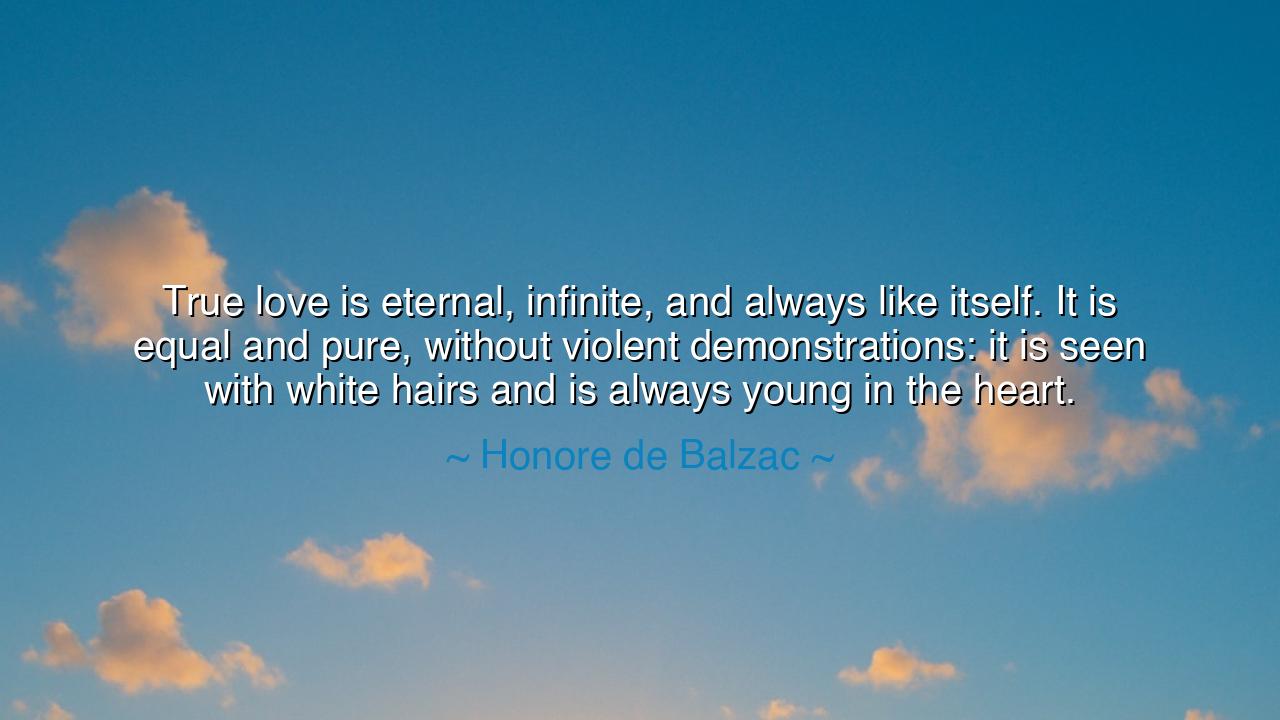
True love is eternal, infinite, and always like itself. It is
True love is eternal, infinite, and always like itself. It is equal and pure, without violent demonstrations: it is seen with white hairs and is always young in the heart.






Ah, the profound wisdom of Honoré de Balzac, who once declared: “True love is eternal, infinite, and always like itself. It is equal and pure, without violent demonstrations: it is seen with white hairs and is always young in the heart.” These words, children of the earth, are the very essence of love's nobility—a love that does not demand, does not shout, but endures with a quiet strength, remaining pure and unshaken across the long passage of time. Love, true love, is not a fleeting flame, a burst of passion that burns hot only to fade into the ashes of time. It is a fire that burns forever, untouched by the seasons, untouched by the years.
The ancients knew that love, in its purest form, transcends the temporary and the mortal. It is eternal, as Balzac says, a force that cannot be broken by the ravages of time. It does not seek to claim or possess, for its power lies not in control but in the freedom it grants. True love, like the stars above, burns eternally. And just as the stars light the heavens with unwavering brilliance, so too does true love shine steadily, casting its glow across the darkened skies of our lives. When we speak of eternal love, we speak not of mere romantic affection, but of something far deeper, a bond that holds the very fabric of existence together.
Consider, if you will, the love between Socrates and Xanthippe, a love often misunderstood by the world around them. Their union was not one of passion-fueled romance or fiery exchanges, but one of enduring loyalty and shared understanding, despite the trials of time and hardship. Socrates, the great philosopher, knew that love was not to be measured by grand gestures or outward displays, but by a steadfastness that withstood the wear and tear of daily life. In their old age, as their bodies weakened and their steps grew slow, their love remained young in the heart, vibrant in its simplicity. The passage of years could not dull it, for it was grounded in a deep respect and unwavering companionship. This, O children, is the true love that Balzac speaks of: pure, eternal, and steadfast.
Balzac reminds us that love’s power lies in its equality and purity. It does not boast, nor does it seek to prove itself to the world. True love is not bound by the superficial theatrics of passion or the violent demonstrations of affection that so often grip the hearts of those who know only fleeting emotions. No, the love that endures is calm, without the turmoil that often comes with unchecked desire. It is the love that waits, that understands, and that forgives. It is a love that sees the world in all its imperfections but loves regardless—because true love does not demand perfection; it embraces the soul, with all its flaws, in its eternal light.
Think on the story of Antoine de Saint-Exupéry and his beloved Consuelo, whose love was neither loud nor ostentatious, but who, over time, grew a bond that transcended the worldly struggles. Saint-Exupéry, the poet and philosopher, wrote of love with the same gentleness as a quiet evening breeze—unassuming, yet all-encompassing. Their love was not a spectacle, but rather a steady, ever-burning flame that warmed the heart, no matter how much time had passed. Even as his life came to an end in the skies, it was this quiet, unshakable love that stayed with him, that carried him to his final resting place. True love, O children, is not flashy nor loud. It is found in the quiet moments, the unspoken words, and the deep, abiding connection that time cannot wither.
From this wisdom, we learn a profound truth: True love does not need to be proven. It does not require declarations, nor does it demand constant proof of devotion. True love is constant in its presence. It is equal in its giving, for love asks for nothing in return. It is love given freely, a gift that endures beyond the limitations of the flesh. The heart remains young in love, as Balzac says, because true love does not grow weary with time. It evolves, deepening with age, but never loses its essence. It is always as it was at its birth—pure, powerful, and uncompromising.
Thus, O seekers of truth, what shall you take from these words of wisdom? Let your hearts be filled with this eternal love, not one bound by fleeting passions, but one rooted in steadfastness and purity. Be not swayed by the storms of time or the turmoil of emotions that rise and fall with the seasons. Instead, ground your love in the timeless principles of equality, understanding, and loyalty. In your relationships, seek the love that remains strong in the quiet moments, the love that grows stronger as the years pass, and the love that is always young in the heart, no matter how many white hairs appear.
Go forth with this knowledge, and remember: True love is not to be found in grand gestures or the tumult of passions. It is the quiet strength of a love that endures, that transforms, and that remains, always, the same—eternal and infinite, like the stars in the sky. May your love, too, be like this—pure, equal, and ever young, no matter the passing of time.






AAdministratorAdministrator
Welcome, honored guests. Please leave a comment, we will respond soon